Al-Qaeda on Brink of Collapse but New Threats Arise: Officials

Osama bin Laden's death and a relentless campaign of drone attacks have weakened al-Qaeda to the point that the terror organization may no longer be capable of planning and carrying out large-scale attacks, officials told The Washington Post.
U.S. Defense Secretary Leon E. Panetta declared during a recent visit to Afghanistan that "we're within reach of strategically defeating al-Qaeda," a statement whose optimism officials tempered with the fact that America still faces threats from the jihadist ideology al-Qaeda espoused and from the organization's offshoot in Yemen.
But bin Laden's death deprived the organization of its strategic mastermind and its charismatic leader, dealing a severe blow to a network whose leadership had already been decimated by a stready campaign of strikes. Missiles fired from drones have killed some 1,200 leaders since 2004, wiping out what one official called a "number of generations of leaders."
"If you mean that we have rendered them largely incapable of catastrophic attacks against the homeland, then I think Panetta is exactly right," an official speaking on the condition of anonymity told the Post. "We are within reach of rendering them to that point."
Al-Qaeda's potential demise turns attention to a new landscape of terrorism, one in which individuals or rogue cells may become more common than a large, hierarchical organization. The military has shifted its attention to ascendant terror groups outside of al-Qaeda's Pakistan base. The Obama administration has authorized a campaign of covert drone strikes against Yemen's al-Qaeda affiliate, which has sought to capitalize on the chaos convulsing the country, as well as strikes against Somalia's Shabab movement.
© Copyright IBTimes 2025. All rights reserved.





















